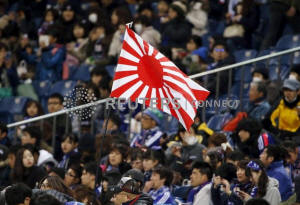Tokyo Olympic organizers say no
plans to ban 'Rising Sun' flag despite South Korean demand
 Send a link to a friend
Send a link to a friend
 [September 13, 2019]
By Linda Sieg [September 13, 2019]
By Linda Sieg
TOKYO (Reuters) - Tokyo Olympic
organizers said on Friday that the display of Japan's "Rising Sun"
does not constitute a political statement and a spokesman said there
were no plans to ban the controversial banner, as demanded by South
Korea.
The flag, a centuries-old symbol that was also used by Japan's
military during World War Two, is the latest diplomatic football in
a worsening feud between South Korea and Japan over the bitter
legacy of their shared past.
South Korea's Sports Ministry this week asked the International
Olympics Committee to prohibit any use of the flag, which it likened
to the Nazi's use of the swastika.
Tokyo 2020 does not anticipate banning the "Rising Sun" flag,
spokesman Masa Takaya told Reuters.
"The 'Rising Sun' flag is widely used in Japan and we think the
display of the flag is not a political statement," the Tokyo 2020
organisers said in a statement, echoing the committee's previous
stance.

The statement added that, as had been done at past Games, it was
considering designating non-participating countries' flags as among
items that cannot be brought into venues. Takaya said this was a
general statement, not a reference to the "Rising Sun" flag.
Ties between Washington's two Asian allies have deteriorated to
their worst level in decades after South Korea's Supreme Court last
October ordered some Japanese firms to compensate Koreans forced to
work in their wartime mines and factories. Japan says the matter was
settled by a 1965 treaty.
The feud has since jolted trade and security ties.
Many Koreans resent the "Rising Sun" flag as a symbol of Japan's
1910-1945 colonisation of the peninsula, but its use has become more
controversial as relations with Japan chilled.
LONG, COMPLEX HISTORY
The "Rising Sun" flag - a sunburst with 16 rays - is separate from
Japan's "Hinomaru" flag that was legally made the national flag in
1999. Domestic critics at the time opposed the move because of its
association with wartime militarism.
Japan's Olympic team uses the "Hinomaru" flag, a red disc on a white
background.
The "Rising Sun" flag, flown by Japanese feudal warlords, was
adopted in 1870 as the flag of the Japanese Imperial Army. In 1889
it became the navy ensign.
[to top of second column] |

Japan's soccer fans raise the Rising Sun flags before the match
against Afghanistan. REUTERS/Toru Hanai

It was then adopted as the ensign of the Maritime Self-Defence
Force, as Japan's navy is known, when the MSDF was established as
part of Japan's Self-Defense Forces in 1954.
Last year, Japan called off its plan to take part in an
international fleet review in South Korea after Seoul asked it not
to fly the flag on warships - although it had done so without
objections in fleet reviews in 1998 and 2008.
China, which also shares a bitter wartime history with Japan, did
not complain when a Japanese naval vessel flew the "Rising Sun"
ensign during an April visit to a Chinese port.
Football's governing body FIFA, however, has banned its use and in
2017 the Asian Football Confederation sanctioned Japan after
Japanese fans flew the flag at an AFC Champions League.
The "Rising Sun" flag is a favourite of Japan's ultra-right, but it
is also used on commercial products and is a corporate logo of the
liberal Asahi newspaper.
Some experts said comparisons to the Nazi swastika were overdone.
"The swastika is indelibly linked to the Gestapo, the Holocaust and
the horrors of Nazism," said Jeff Kingston, director of Asian
studies at Tokyo's Temple University campus.
"The Japanese view this as a flag with a long tradition extending
well beyond Japanese colonialism," he said. "For Korea, it
symbolises unresolved grievances of the colonial era."
(Reporting by Linda Sieg; Editing by William Mallard & Simon
Cameron-Moore)
[© 2019 Thomson Reuters. All rights
reserved.] Copyright 2019 Reuters. All rights reserved. This material may not be published,
broadcast, rewritten or redistributed.
Thompson Reuters is solely responsible for this content.
 |